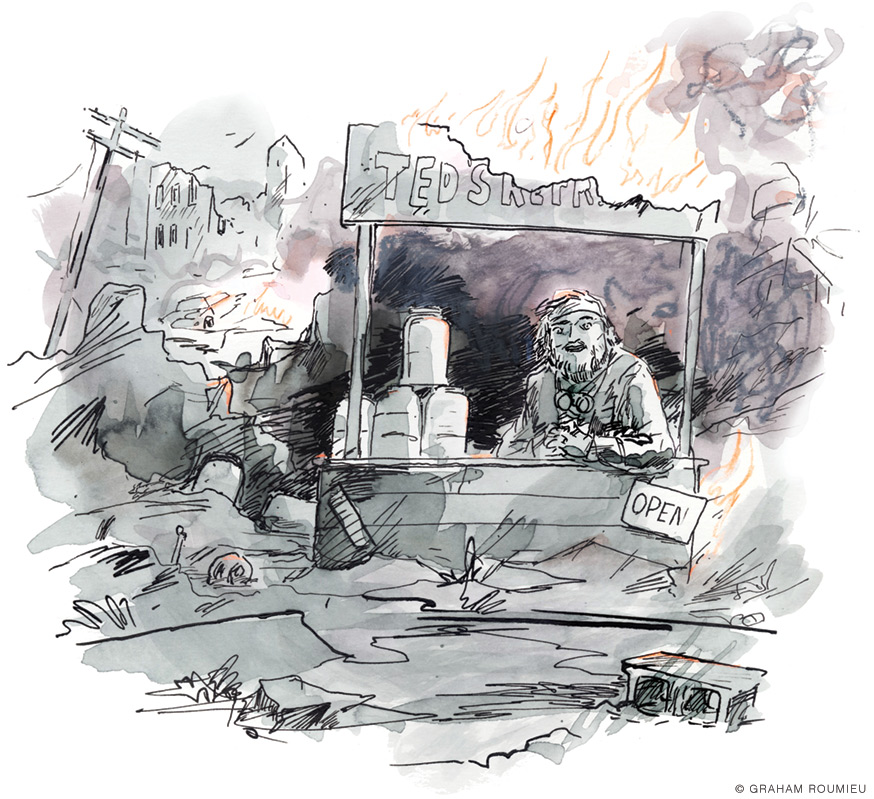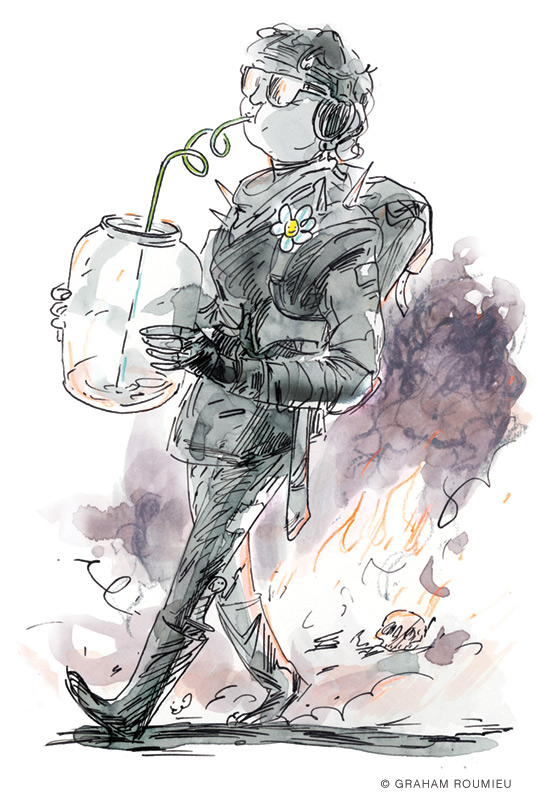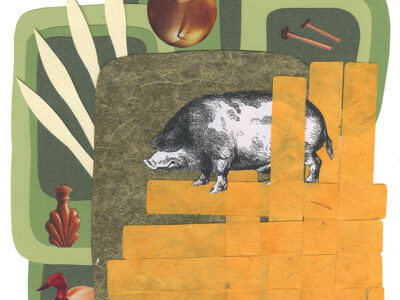
A prepper’s guide.
By Joshua Piven and David Borgenicht
Editor’s note: In the nearly 25 years since publishing the original Worst Case Scenario Survival Handbook, Joshua Piven C’93 and David Borgenicht C’90 have churned out editions on how to survive everything from college to parenting to holidays. Their latest offering cuts straight to the endgame: the apocalypse. For readers disinclined to wait idly for the next pandemic—or robot uprising, or cloned dinosaurs—they have some practical advice … and a beverage-pairing suggestion for the Last Days.
How to Apocalypse-Proof Your Finances
1) Go back to paper.
The global financial system is digital. With the exception of hard currency and gems or minerals (which have no intrinsic value on their own), all accounts, records, credits, debits, and investments are held electronically. In an apocalyptic event—or even a major cyberattack—records of your assets may be lost or inaccessible for long periods. To prepare, go online and print records of your investments and bank accounts at the end of each trading day. These will serve as proof of ownership later, should you need it.
2) Ensure you have an “air gap.”
Dedicate a separate computer and printer to the process of collecting and printing your documents, located in a secure, fireproof room. Disconnect the computer from the internet (called air-gapping) when it’s not in use to protect against cyberwarfare.
3) Avoid digital currency.
Bitcoin, Dogecoin, Ethereum, and the like do not exist as physical money. In the apocalypse, they will be inaccessible and worthless, and the energy-intensive mining system will collapse.
4) Hold some cash, but do not convert everything.
The US dollar and all other major currencies are independent of the gold standard and are essentially a promise to pay. In the early stages of the apocalypse, when the banking system is faltering, there will be bank runs and moves to cash, and dollars may continue to be accepted in place of credit. However, with time hard currency will likely become worthless as a barter and exchange economy re-forms. Keep whatever’s left for starting fires.
5) Buy land, especially good farmland or timberland.
In a postapocalyptic feudal, agrarian, or preindustrial society, landowners will control both the means of production and, potentially, any housing stock that still remains. The more property you own, the more options you will have not only to evacuate, but to begin again with something of value. If you already own your home and/or land, keep good paper records of any deeds to prove ownership.
6) Consider mortgage options.
In a global apocalypse, banks and mortgage companies will disappear, so paying off your mortgage beforehand may be pointless: there will be no one left to foreclose on you. However, in a more temporary disaster, these organizations will almost surely bounce back after some period of instability and come for what you owe.
7) Hold some physical gold.
Gold is essentially indestructible and may be useful as barter early in the apocalypse, but less so as time passes. Though ancient civilizations valued gold—a soft metal—it was for ornamental, not practical, purposes.
8) Stockpile barterable items.
Space permitting, use currency today to purchase things that will be useful in the coming apocalypse, such as solar chargers, portable batteries, water purifiers, seeds, coolers, axes and bush knives, and guns and ammunition. If you have room, raise chickens and rabbits.
9) Spend it all now.
Expect, and prepare today, to live simply later. Spend down most of your assets before the apocalypse. This will both minimize regret at what’s been lost later and, once your possessions are mostly gone, provide necessary practice for living a more subsistence-based life.
How to Hide Your Preparedness
1) Shop late at night, or online.
Other shoppers may be suspicious if your cart is filled with 50 cans of Dinty Moore Beef Stew, 200 pounds of rice, or 12 car batteries. Make multiple trips over time, or order in bulk online. Items delivered via forklift are sure to arouse suspicion.
2) Avoid camouflage and flannel.
Nobody is hunting you, and if you will be hunting, you can change later. Preppers favor durable brands like Carhartt, but consider Patagonia’s more fashionable outerwear, which is well-made and long-lasting.
3) Do not wear a utility belt.
A heavy-duty belt with a Leatherman or other multi-tool, a sheathed buck knife, and bear spray may tip others off that you’re a prepper. Most people now carry a cell phone in a pocket, not a belt pouch. Zip ties are scary.
4) Use appropriate language.
There’s a fine line between reasonable preparation and prepping. Instead of saying “We will be the only ones left standing after a mass-extinction event,” say “I think we’ll be OK for a few days in a storm.” If someone asks, “Why are you dehydrating 50 pounds of beef?” say “Would you like some jerky?”
5) Do not use potential trigger words.
Words and phrases like ham radio, iodine tablets, dosimeter, and gas masks are sure to make nonpreppers suspicious. N95 mask may now be used in casual conversation.
6) Never ever show off your prepper pantry, safe room, or bunker.
Resist the urge to brag about all your hard work, the money you’ve spent, how safe you feel, or how long you can hold out when it hits the fan. Preppers tend to believe they are smarter than the average person, so staying silent may be challenging.

How to Drink Your Own Urine
While urine is mostly free of pathogens, drinking large quantities in a short period of time may lead to kidney failure. Take the following steps to make your pee safer to drink.
1) Obtain a glass jar or other container.
Urine contains dissolved minerals—salt, potassium, phosphorus—and chemicals (primarily urea and uric acid) that can make you sick: do not drink warm urine. Urinate into a container and set it aside.
2) Wait several days.
Leave the container at room temperature for three days if time allows. Over time, naturally occurring urease enzymes will decompose the urea (the major constituent in urine, aside from water), forming ammonia and ammonium ion. This process will make the urine smell terrible but will make it easier to treat chemically.
3) Add a handful of ash.
Ash, as from a wood fire, adds alkali to the urine and will raise the pH (alkalinity). This process will convert most of the ammonium ion to ammonia. While ammonia is quite volatile, it’s easy to remove. Allow the mixture to sit for several hours, then strain if possible.
4) Boil the urine for a few minutes.
This will cook off the ammonia (as well as any remaining pathogens) and make the urine safe to consume. Allow it to cool before enjoying.
Joshua Piven C’93 and David Borgenicht C’90 are the authors of The Worst-Case Scenario Survival Handbook: Apocalypse, from which this is adapted with the permission of Quirk Books.




